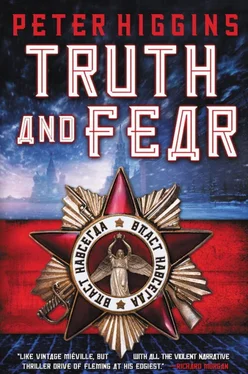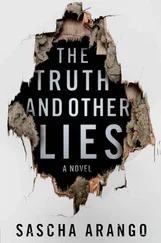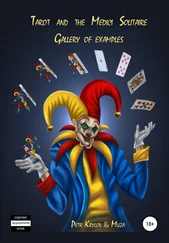The follower was starting to slow, looking left and right, letting Maroussia get ahead of him. He knows I’m here.
Lom increased his pace, reeling him in. He’d got within thirty yards when the man spun on his heels and looked behind him. Straight at Lom. It was like he’d been punched in the chest. All the breath gone out of him. A constriction in the throat.
The face looking at Lom was his own face.
They locked gazes. The follower made a curt nod, spun on his heel and walked rapidly away.
The shock cost Lom a second. Then he reacted. He started forward but got tangled up with an old woman with a dog on a leash and a bag of groceries. By the time he got free the astrakhan hat was disappearing into a side street. When Lom reached the turning there was no sign of him.
Halfway down the street was a café with tables outside. Lom pushed the door open and went in. It was a long dark place, full of shadowed nooks and crannies and booths, thick with the smell of coffee and peppery, meaty stew. Lamps and candles spilled pools of yellow light and deep brown shadow. Most of the tables were empty. A radio was playing a big band march, ‘Ours Are the Guns’.
Almost at the back of the room a man was sitting alone with his back to the door. A pale grey astrakhan hat. A wine-coloured woollen scarf. He was writing by the light of a flickering oil lamp. There was nothing else on the table. No cup. No plate. Lom threaded his way between the tables.
‘Hey,’ he said.
The man stood up and turned round. It was a different person, taller and older, with narrower shoulders. A long oval face under the grey astrakhan. A face full of serious openness. Deep dark eyes looked into Lom’s from behind black wire-rimmed spectacles, wise and a little sad. He had a vaguely military bearing, but it wasn’t a soldier’s face. A doctor’s perhaps. Or a poet’s.
‘Yes?’ he said. ‘Can I help you?’
‘Sorry,’ said Lom. ‘I thought you were someone else.’
‘Ah. Then excuse me, please.’
Lom stepped aside to let him pass and scanned the rest of the café but there was no one else. As he was turning to go, he saw the man had left something on the table. A single sheet of paper, folded once. A name was printed on it in a large clear hand. In capitals. Meant to be noticed. ‘ VISSARION LOM ’.
He picked up the note and read it.
‘ Keep her safe. I will watch when I can .’
It was signed ‘ Antoninu Florian ’.
Lom snapped his head round but the man had gone. Shit. He hustled back out into the street and looked both ways, but there was nothing to see. He refolded the note and tucked it into his pocket.
On Captain Iliodor’s desk the telephone coughed into life. He picked it up first ring.
‘Yes?’
‘Glazkov, Captain. There was an incident an hour and a half ago in Braviknaya Square. A fracas with some young patriots outside a Lezarye bookshop. Four men are in the Bellin Infirmary—’
Iliodor interrupted him impatiently.
‘Why are you telling me this? This is hardly unusual.’
‘It was done by one man, Captain. One man against many. A man competent in violence. And there was a woman with him. The name Shaumian has come up. Shaumian and Lom.’
‘This was an hour and a half ago ? And I’m only hearing about it now ?’
‘The victims were unable to make an identification. A witness was found, a girl, but her testimony was… reluctant. The interrogation took some time.’
‘ An hour and a half? ’
‘The subjects are reported to be walking north. Towards Big Side. I’ll get the written report across to you immediately.’
‘You will tell me yourself, Glazkov. Tell me all of it. Now.’
The underground chamber deep beneath the Lodka is lit by the bluish flicker of fluorescent tubes. The gantry stands a hundred feet high and drips with decorative ironwork. Life-size figures of pensive women with long braided hair; plump naked children riding dolphins. An obelisk crowns the dome, and the entire construction is painted burgundy and green. Within the outer framework the alloy containment helix winds upwards like a single strip of orange peel.
Inside the gantry the Pollandore hangs, a perfect globe high as a house, revolving slowly, touching nothing. It glows with is own vaporous luminescence but casts no light. It has no weight. No temperature. Frictionless, it turns on its own axis and follows its own orbit, parallel to but no part of this world, not in this universe but its own, tainting the air of the chamber with a faint smell of lake-water and damp forest floor.
The gantry is almost four hundred years old. It was built soon after the Vlast captured the Pollandore from Lezarye. There was a plan to show it in public–a trophy, a holiday wonder, a kopek to climb to the viewing platform and look down into the heart of strangeness–but this never happened. Perhaps it was never meant to. Perhaps one of the madder descendants of the Founder had the gantry made for his own private pleasure. Perhaps he came down to it alone, at night, driven by some urge to reach out and touch the Pollandore, to run his palm along the underside of another world. And his hand would slide across the skin between alternative possibilities, feeling nothing and leaving no impression.
Whatever. Soon after the gantry was made, the Pollandore was consigned to the lowest basement of the Lodka, its existence denied and redacted from the files. Through the centuries that followed, the Vlast periodically tried to destroy it. The Pollandore survived fire and furnace, explosives, the assault of war mudjhiks. Subtler methods were attempted: corrosives, vacuums, the agonisingly slow insertion of invisibly fine needle-points. Nothing affected it. Nothing at all.
The only thing they didn’t do was take it out to the deepest trenches of the ocean and sink it. They would not do that. If they could not destroy it, the Vlast preferred to know where it was.
And the Pollandore went on turning on its own axis.
Being other.
Being something else.
But now inside the Pollandore planetary currents are stirring. Masses are shifting.
It watches and waits.
Its time is close.
It was almost three in the afternoon when Lom and Maroussia reached the street where Vishnik had his apartment. Where Raku Andreievich, formerly Professor Prince Raku ter-Fallin Mozhno Shirin-Vilichov Vishnik, one-time historian of Mirgorod and city photographer, had lived among his books and paintings. Where he had died, slowly and painfully, under the interrogation of Chazia’s police.
They surveyed the building from the shadow of a shuttered droshki kiosk on the corner. There was no sign of militia surveillance. The dvornik was at his station outside, slumped in his folding wooden chair, chin buried in a dirty brown muffler, nursing a tin mug in gloved hands. The subsiding flood water had left a smashed-up handcart with no wheels lying canted against the canal-side bollards. A couple of boys were kicking at it, trying to break it up for firewood, but they didn’t have the weight to make an impact. After a while they gave up and dragged the whole thing away. The dvornik’s small black eyes watched them resentfully. He looked like he’d been pulled up out of the canal mud himself and left outside collecting snow.
‘He can’t stay there all day,’ said Maroussia. ‘He has to move sometime. Everyone has to piss.’
‘We haven’t got time for this,’ said Lom. ‘Come on.’
The eyes of a dozen other dvorniks followed them from their chairs and lobbies. Informers every one, watchers and listeners, recording comings and goings in their black notebooks. The dvornik at Vishnik’s building recognised them. His little berry-black eyes widened even more when Lom pulled his hand partly out of his pocket to show him the grip of the Sepora .44.
Читать дальше


![Кэмерон Доки - Правда и ее последствия[Truth and Consequences]](/books/79610/kemeron-doki-pravda-i-ee-posledstviya-truth-and-con-thumb.webp)









